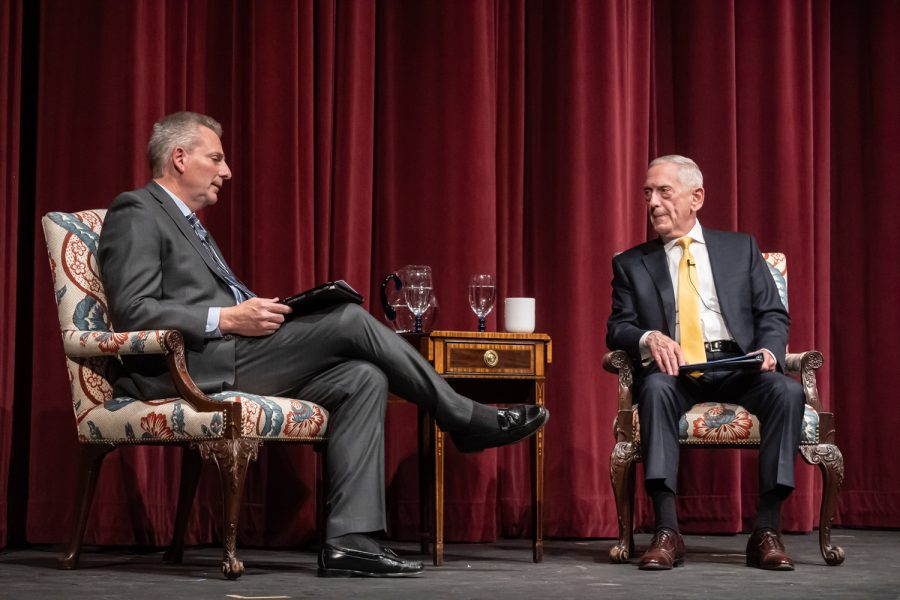Former Secretary of Defense James Mattis concerned about future of democracy
Mattis discusses war, political discourse
James Mattis (right), former U.S. Secretary of Defense, answers questions from Cornell Clayton (left), director of Thomas S. Foley Institute for Public Policy and Public Service, at “Democracy at home and abroad”, March 24, Bryan Hall Auditorium.
March 26, 2022
The Thomas S. Foley Institute hosted former U.S. Secretary of Defense James Mattis on Thursday, who said the U.S. needs to continue supporting Ukraine to ensure that democracy stays strong both domestically and globally.
“With this recent invasion of Ukraine, we saw the events of many decades take over,” he said.
Mattis said people may have a lot of arguments with each other, but when we all pull together at home with our allies and like-minded nations, that is going to give Putin problems.
He said the Biden administration has handled the situation well so far with the weapons and intelligence that they have shared with Ukraine.
Mattis was not shy in his disgust for Russia’s actions and war crimes.
“In war you can not willingly and wittingly kill women and children,” he said. “Have the Russians done that? You’re darn right they have, as well as hundreds of other crimes.”
Mattis also expressed displeasure with China’s response to the Russia-Ukraine war.
“I think very few nations are gonna look at China’s actions as anything else but full-fledged support for Russia,” he said.
Mattis said the future relationship of the U.S. and China must be dictated by philosophical discussions similar to the relationship that the U.S. and the Soviet Union had during the Cold War.
Mattis said he hopes that current and future students will go into diplomatic and military history despite declining interest in the subject across the nation.
“We need young people to come in with fresh ideas to help guide us through this perilous time,” Mattis said.
Mattis’ concerns for the future of America are illustrated by his reference to Abraham Lincoln’s young men’s Lyceum Address and said if this great experiment called the U.S. will fail, it will die by suicide instead of foreign invasion.
Cornell Clayton, director of the Thomas S. Foley Institute, asked for Mattis’s thoughts on the Jan. 6 Capitol riots.
Mattis said he doubted the riots at first and wanted to deny it was happening.
“I was disappointed and by that evening, I was disgusted,” he said.
If people cannot keep our friendship and respect for each other, the U.S. will not have a government that is of the people, by the people and for the people,” he said.
He said the country needs young people to reject the “gladiatorial combat” that is modern political discourse. Mattis spoke for about an hour, and although there was a lot of content to get through, he decided to parse it down a bit.
“I have a 72-page speech to give,” he said. “I decided not to subject you to that because it’s a violation of the constitution’s prohibition of cruel and unusual punishment.”

















